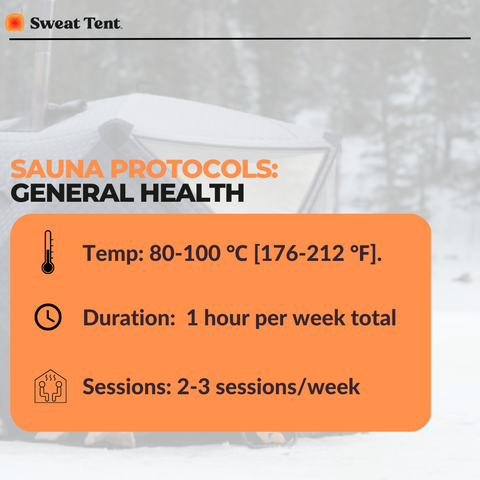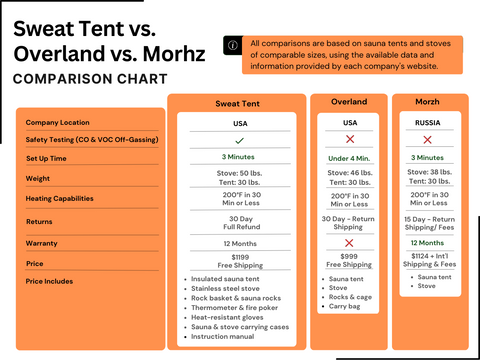Sauna bathing offers proven benefits for our physical, mental, and cardiovascular health, but what about weight loss? Do saunas help you lose weight?
The short answer? Yes—although not as directly or instantaneously as you might be hoping for.
Sauna bathing can be a valuable tool to support weight loss efforts, while also unlocking numerous other physical and mental health benefits.
One significant benefit of sauna bathing is its ability to help shed water weight, which is why it's popular among weight-based sports like MMA and boxing. It can even serve as an alternative to exercise for individuals with chronic diseases or physical limitations. Even so, it's important to note that sauna bathing alone cannot replace proper diet and exercise for achieving sustainable weight loss.
So, how exactly does the sauna help you lose weight? Read on as we explore the science behind sauna bathing for weight loss, along with the benefits you can expect to experience from incorporating a sauna into your health and fitness journey.
What We’ll Cover:
1. 5 Benefits of Sauna for Weight Loss
1.1 Increase Metabolism
1.2 Reduce Stress
1.3 Improve Sleep Quality
1.4 Improve Aerobic Capacity
1.5 Improve Muscle Recovery
2. General Sauna Tips
3. Optimize Your Health with Sweat Tent
4. Additional Resources
5 Ways Sauna Contribute to Weight Loss
Does the Sauna Burn Calories? How Sauna Increases Metabolism
Of the many fads, myths, and facts about weight loss, there is one foundational pillar we know to be true: weight loss cannot occur if there are more calories consumed and stored, than calories burned. That’s why to successfully lose weight, calories in versus calories out must be accounted for. One of the many benefits of sauna bathing is that it increases metabolic rate to burn calories.
Metabolism is a natural chemical process that converts food into energy to fuel the body. Physical activity, like strength training, aerobic exercise, and yes—even sauna—can boost metabolic function to burn calories. Here’s how:
When the skin is exposed to temperatures above our resting body temperature, the brain initiates a cool-down response. As our outer shell (skin) heats up above resting body temperature (up to a 3.5-degree increase), thermoreceptors all over the body signal to the brain that it needs to cool down. In turn, our heart rates rise upwards of 120-150 bpm, blood vessels dilate, and we sweat.

Sounds like what happens when you exercise, right? That’s because sauna bathing produces the same physiologic responses (increased heart rate, vasodilation, and sweating) experienced during moderate to intense aerobic exercise.
A study on the cardiovascular and metabolic effects of repeated sauna bathing resulted in a metabolic increase between 25 and 33 percent after just one day of sauna bathing.
How many calories do you burn in the sauna?
The amount of calories you burn varies based on factors like heart rate, body weight, muscle-to-fat ratio, and metabolism, along with sauna temperature and length of your sauna session.
For the most accurate measurement of how many calories you’ve burned in the sauna, we highly recommend wearing a smartwatch or activity tracker that monitors personal health metrics like heart rate, heart rate variability, stress tracking, and more.
Related: How Long Should You Stay In the Sauna for Optimal Benefits?
Reduce Stress
Another way the sauna helps support weight loss is by reducing stress.
Stress is a normal part of our lives, hardwired in us for our safety and survival. But when stress is left unmanaged (or poorly managed), a chain of events unfolds that can lead to weight gain. Here are five ways stress impacts our weight:
-
Increased cortisol: Increases in the stress hormone cortisol can intensify cravings and appetite for high-calorie foods.
-
Emotional eating: Cortisol-induced cravings can lead to unhealthy patterns of emotional eating.
-
Disrupted sleep: When stress has you tossing and turning in bed, you’re not getting the proper sleep you need to restore your body. This type of deprivation can reduce metabolism, and increase cortisol levels.
-
Decreased metabolism: Increased cortisol slows metabolism, making it easier to store fat, and more difficult to burn calories.
The benefits of sauna for stress
Regular sauna use has been proven to not only reduce stress by promoting the release of dopamine and endorphins–our “feel good” chemicals— by up to three times their normal amounts. In turn, we benefit from improved mood, reduced feelings of physical pain, and better stress resistance, not to mention potentially helping decrease the risk of psychotic disorders later in life, as one prospective cohort study suggests.
With reduced stress levels, we are less prone to emotional eating or feeling hungry because of elevated cortisol. Metabolism levels are also more easily regulated, which can help burn more calories and support sustained weight loss.
Improve Sleep Quality
It’s true that low quality or lack of sleep can impact our weight. It’s also true that sauna bathing, especially later in the day or evening, can enhance sleep to support our physical, mental, and emotional health.
Quality sleep plays a crucial role in how we function throughout the day. Whether caused by stress, pain, discomfort, or another cause, poor sleep impedes our ability to achieve deep sleep—the most important stage of sleep humans need to recover and repair the body. Considering we spend one-third of our lives asleep, we’d say it’s one of the most important factors of overall health and well-being! Here are five ways low quality or lack of sleep affects weight:
-
Hormonal regulation: Lack of sleep can reduce leptin (the satiety-inducing hormone) and elevate ghrelin (the appetite-stimulating hormone), leading to an increase in appetite and food cravings, and the opportunity to overeat.
-
Metabolism: With hormones leptin and ghrelin out of balance, metabolism is slowed, making it harder to burn calories and lose weight.
-
Energy: Poor sleep quality can lead to low energy levels, which can make it difficult to stick to an exercise routine and maintain a healthy diet.
-
Late-night snacking: With elevated ghrelin stimulating appetite, it’s easier to overeat. Also, people who stay up late are more likely to engage in late-night snacking, increasing calorie intake, and subsequent weight gain.
How sauna supports better sleep
Not only does the sauna help us de-stress and reduce tension, but it also initiates the release of melatonin—a vital hormone for sleep. If a lack of sleep is causing you stress, fatigue, and causing you to overeat, try sauna bathing before bed. With better sleep under your belt, you’ll have more energy, a higher stress tolerance, and better hormone regulation.
Improve Aerobic Capacity
Another way the sauna helps with weight loss is by increasing your aerobic output, making it easier to increase your physical output before tiring.
One study researching the effects of post-exercise sauna bathing for endurance performance of competitive male runners found that sauna bathing increased run time to exhaustion by 32%. The researchers believe that the increase in endurance was likely due to the increase in blood volume that occurred during the sauna sessions.
With increased output capacity, those trying to lose weight can exercise for longer, or sustain harder workouts, to burn more calories and successfully lose weight.

Improve Muscle Recovery
Getting back into a new exercise routine can be difficult, and sore muscles certainly don’t help. One way saunas can help with weight loss is by helping speed up your recovery time by relaxing and repairing muscle tissue.
Aside from helping you achieve better sleep (a crucial period of total body repair), deliberate heat exposure through the sauna both relaxes muscles and increases the amount of oxygen-rich blood and human growth hormone released throughout the body. In turn, this helps reduce inflammation and repair muscle tissue more quickly. What does it mean for your weight loss? Less downtime from sore, achy muscles!
Using a sauna to kickstart your weight loss journey with improved sleep, energy, stress levels, and reduced levels of pain and muscle fatigue, is also a relaxing, enjoyable experience.
General Sauna Tips for a Safe Sweat
Traditional sauna bathing is a method of deliberate heat exposure in which you are exposed to high temperatures, generally between 80°C to 100°C (176°F to 212°F). During a typical sauna session, the average person loses about 0.5 kg of sweat. For this reason, it’s crucial to drink plenty of water 16 ounces every 10 minutes in the sauna) and electrolytes before and after sauna bathing to avoid dehydration.
To ensure comfort during the session, wear loose, breathable clothing made of materials like cotton or bamboo that allow for airflow. If you’re new to sauna bathing, it’s important to build up your heat tolerance gradually. Doing so can help ensure you avoid dehydration, along with prolonging the benefits of your sauna session. Take breaks as necessary, and while discomfort is common, never push past what feels unsafe, like dizziness or headaches.
Optimize Your Health with Sweat Tent
Combined with proper diet, exercising, and even deliberate cold exposure, individuals looking to achieve sustained weight loss can greatly benefit from regular sauna bathing.
With Sweat Tent’s home sauna tent, you can optimize your health and weight loss goals with a traditional wood-fired sauna without leaving home or calling in the contractors.
With no need for electricity, zero EMF risk, setup in under three minutes, and 200°F of heat in any environment, you’ll be up, running, and well on your way to better health in no time.
See Sweat Tent in action on Instagram (@sweattents), or share your own experiences with us using the hashtag #sweattent!
Medical disclaimer: This post is intended for informational purposes only and is not a substitute for professional medical advice. Please consult with your doctor before adding sauna bathing to your health and wellness routine.
Additional Resources:
https://www.mayoclinic.org/healthy-lifestyle/weight-loss/in-depth/metabolism/art-20046508
https://www.mayoclinic.org/healthy-lifestyle/weight-loss/in-depth/calories/art-20048065
https://healthresearchfunding.org/calories-burned-sauna/
https://linkinghub.elsevier.com/retrieve/pii/S0306987708006518
https://pubmed.ncbi.nlm.nih.gov/3766176/
https://www.ncbi.nlm.nih.gov/pmc/articles/PMC6422146/









